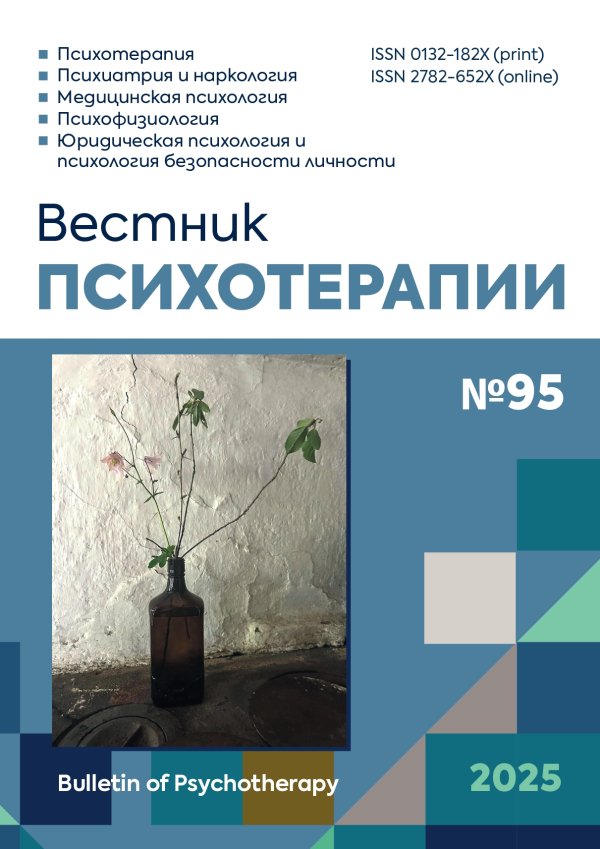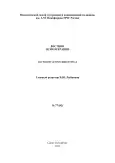Влияние на удовлетворенность пациентов реабилитационной помощью анкет, заостряющих внимание на положительных впечатлениях от получаемых процедур
- Авторы: Харитонов С.В.1, Тагирова Д.И.1, Ксенофонтова И.В.1, Лямина Н.П.1, Голубев М.В.1
-
Учреждения:
- Московский научно-практический центр медицинской реабилитации, восстановительной и спортивной медицины
- Выпуск: № 77 (2021)
- Страницы: 98-116
- Раздел: Медицинская психология
- URL: https://journal-vniispk.ru/0132-182X/article/view/310488
- ID: 310488
Цитировать
Аннотация
В настоящем исследовании приняли участие 229 больных, получающих реабилитационную помощь в связи с широким спектром заболеваний позвоночника и суставов и последствиями травм. Проводилась оценка удовлетворенности больных медицинской помощью в зависимости от того, применялись ли анкеты, концентрирующие внимание больных на положительных ощущениях, связанных с процедурами массажа и бальнеолечения (основная группа), или таких анкет не было (контрольная группа) Пациенты были распределены в контрольную (46 человек) и основную (183 человека) группы. В обеих группах пациенты получали сеансы массажа и бальнеолечения. Средний возраст в обеих группах составил 62,4 ± 8,8 года. Мужчин в обеих группах было 73 человека, женщин 156 человек. Распределение в группы являлось рандомизированным с помощью генератора случайных чисел. Все пациенты двукратно (до и после массажа и бальнеотерапии) заполняли опросник PPE-15, позволяющий оценивать уровень удовлетворенности больных по нескольким доменам. В основной группе отличием являлось то, что пациентам после массажа и бальнеотерапии предлагалось заполнить специально разработанную нами анкету, где фиксировалось внимание пациента на выраженности у него положительных ощущений. Анкеты предлагалось заполнять на фоне переживаемых пациентами ощущениях (с высокой вероятностью положительных), связанных с процедурой массажа или бальнеолечения. Определено, что использование потенцирующих анкет на фоне положительных впечатлений, связанных с массажем и бальнеотерапией, способствует росту удовлетворенности медицинской помощью в части психологических аспектов функционирования. По критерию Колмогорова–Смирнова различия являлись достоверными при р < 0,0001 (максимальная разница = 0,38). Но применение потенцирующих анкет не приводит к статистически достоверному повышению удовлетворенности пациентов в части их информированности, не влияет на оценки, связанные с уважением к больному, не оказывает существенного воздействия на физическое состояние и оценки, касающиеся вовлеченности близких людей. Для более непосредственной оценки субъективно осознаваемой связи между влиянием массажа и бальнеотерапии с применением анкет на уровень удовлетворенности медицинской помощью в учреждении была сформирована случайная рандомизированная группа из 90 человек (по 45 из основной и контрольной группы). Участники данной группы отвечали на вопрос о влиянии массажа и бальнеотерапии на удовлетворенность медицинской помощью в данном учреждении. По данным статистического анализа с помощью четырехпольной таблицы определены статистически достоверные различия между теми, кто заполнял потенцирующие анкеты (чаще были удовлетворены учреждением), и теми, кто не заполнял (реже были удовлетворены учреждением). Критерий Хи-квадрат = 11,072 при р < 0,001, а по критериям критериям V Крамера, К Чупрова, критерия φ (0,35) и критерия Пирсона (0,33) определена средняя сила связи между применением потенцирующих анкет и удовлетворенностью медицинской помощью в учреждении. Таким образом, использование потенцирующих анкет в ассоциации с процедурами, вызывающими приятные ощущения (массаж и бальнеотерапия), способствует росту удовлетворенности больных оказываемой им медицинской помощью в учреждении.
Ключевые слова
Об авторах
С. В. Харитонов
Московский научно-практический центр медицинской реабилитации, восстановительной и спортивной медицины
Автор, ответственный за переписку.
Email: golubevmisha@gmail.com
105120, Москва, ул. Земляной Вал, д. 53
Д. И. Тагирова
Московский научно-практический центр медицинской реабилитации, восстановительной и спортивной медицины
Email: golubevmisha@gmail.com
109316, Москва, ул. Талалихина, д. 26 А
И. В. Ксенофонтова
Московский научно-практический центр медицинской реабилитации, восстановительной и спортивной медицины
Email: golubevmisha@gmail.com
109316, Москва, ул. Талалихина, д. 26 А
Н. П. Лямина
Московский научно-практический центр медицинской реабилитации, восстановительной и спортивной медицины
Email: golubevmisha@gmail.com
105120, Москва, ул. Земляной Вал, д. 53
М. В. Голубев
Московский научно-практический центр медицинской реабилитации, восстановительной и спортивной медицины
Email: golubevmisha@gmail.com
105120, Москва, ул. Земляной Вал, д. 53
Список литературы
- Агеева Н.А. Дефекты оказания медицинской помощи: проблемы и пути решения // Universum: медицина и фармакология. – 2014. – № 6 (7). – С. 2. URL: https://cyberleninka.ru/article/n/defekty-okazaniya-meditsinskoy-pomoschiproblemy-i-puti-resheniya (дата обращения: 16.12.2020).
- Орлов А.Е. Современные проблемы качества медицинской помощи (обзор литературы) [Электронный ресурс] // Вестник новых медицинских технологий. – 2015. – № 1. URL: https://cyberleninka.ru/article/n/sovremennye-problemykachestva-meditsinskoy-pomoschi-obzor-literatury (дата обращения: 16.12.2020).
- Черкасов М.А., Геращенко Н.И., Парфеев Д.Г. [и др.] Русскоязычная версия опросника picker patient experience questionnaire: языковая и культурная адаптация // Междунар. журнал прикладных и фундаментальных исследований. – 2018. – № 3. – С. 91–95.
- Черкасов М.А., Черный А.Ж., Шубняков И.И. [и др.] Комплексная оценка качества оказания медицинской помощи с точки зрения пациента // Новости хирургии. – 2019. – Т. 27, № 1. – С. 49–58.
- Юкиш В.Ф. Актуальные проблемы медицинского обслуживания населения России и перспективы реформирования данной сферы экономики [Электронный ресурс] // Актуальные проблемы гуманитарных и естественных наук. – 2014. – № 5-1. – С. 290–297. URL: obsluzhivaniya-naseleniya-rossii-i-perspektivyreformirovaniya-dannoy-sfery-ekonomiki (дата обращения: 16.12.2020).
- Bąbel P., Bajcar E.A., Adamczyk W. [et al.] Classical conditioning without verbal suggestions elicits placebo analgesia and nocebo hyperalgesia. PLoS One. – 2017. – Vol. 12, N 7. e0181856. doi: 10.1371/journal.pone.0181856. PMID: 28750001; PMCID: PMC5531508.
- Bartels D.J.P., van Laarhoven A.I.M., Stroo M. [et al.] Minimizing nocebo effects by conditioning with verbal suggestion: A randomized clinical trial in healthy humans. PLoS One. – 2017. – Vol. 14, N 12 (9). e0182959. doi: 10.1371/journal.pone.0182959. PMID: 28910291; PMCID: PMC5598922.
- Benedetti F., Piedimonte A. The neurobiological underpinnings of placebo and nocebo effects. Semin Arthritis Rheum. 2019. – N 49 (3S). – S18–S21. doi: 10.1016/j.semarthrit.2019.09.015. PMID: 31779844.
- Blasini M., Peiris N., Wright T., Colloca L. The Role of Patient-Practitioner Relationships in Placebo and Nocebo Phenomena. Int Rev Neurobiol. – 2018. – N 139. – Р. 211–231. doi: 10.1016/bs.irn.2018.07.033. PMID: 30146048; PMCID: PMC6176716.
- Bräscher A.K., Witthöft M., Becker S. The Underestimated Significance of Conditioning in Placebo Hypoalgesia and Nocebo Hyperalgesia. Pain Res Manag. – 2018. – N 28: 6841985. doi: 10.1155/2018/6841985. PMID: 29670678; PMCID: PMC5833150.
- Chida Y., Steptoe A. Positive psychological well-being and mortality: a quantitative review of prospective observational studies. Psychosom Med. 2008. – Vol. 70, N 7. – Р. 741-756. doi: 10.1097/PSY.0b013e31818105ba. PMID: 18725425.
- Dobrila-Dintinjana R., Nacinović-Duletić A. Placebo in the treatment of pain. Coll Antropol. – 2011. – N 35, Suppl 2. – Р. 319–323. PMID: 22220463.
- DuBois C.M., Lopez O.V., Beale E.E. [et al.] Relationships between positive psychological constructs and health outcomes in patients with cardiovascular disease: A systematic review // Int. J. Cardiol. 2015. – Vol. 15, N 195. – Р. 265–280. doi: 10.1016/j.ijcard.2015.05.121. PMID: 26048390; PMCID: PMC4487518.
- Flanigan D.C., Everhart J.S., Glassman A.H. Psychological Factors Affecting Rehabilitation and Outcomes Following Elective Orthopaedic Surgery // J. Am. Acad. Orthop. Surg. – 2015. – Vol. 23, N 9. – Р. 563–570. doi: 10.5435/JAAOS-D-14-00225. PMID: 26195567.
- Jenkinson C., Coulter A., Reeves R. [et al.] Properties of the Picker Patient Experience questionnaire in a randomized controlled trial of long versus short form survey instruments // J. Public. Health Med. – 2003. – Vol. 25, N 3. – Р. 197–201. doi: 10.1093/pubmed/fdg049. PMID: 14575193.
- Kersten P., White P.J., Tennant A. Is the pain visual analogue scale linear and responsive to change? // An exploration using Rasch analysis. PLoS One. – 2014. – Vol. 12, N 9 (6). – e99485. doi: 10.1371/journal.pone.0099485. PMID: 24921952; PMCID: PMC40557.
- Perneger T.V., Kossovsky M.P., Cathieni F. [et al.] A randomized trial of four patient satisfaction questionnaires // Med Care. – 2003. Vol. 41, N 12. – Р. 1343– 1352. doi: 10.1097/01.MLR.0000100580.94559.AD. PMID: 14668667.
- Pouillon L., Socha M., Demore B. [et al.] The nocebo effect: a clinical challenge in the era of biosimilars // Expert Rev. Clin. Immunol. – 2018. – Vol. 14, N 9. – Р. 739–749. doi: 10.1080/1744666X.2018.1512406. PMID: 30118338.
- Reicherts P., Gerdes A.B., Pauli P., Wieser M.J. Psychological Placebo and Nocebo Effects on Pain Rely on Expectation and Previous Experience // J. Pain. – 2016. – Vol. 17, N 3. – Р. 203–214. doi: 10.1016/j.jpain.2015.10.010. PMID: 26523863.
- Rossettini G., Camerone E.M., Carlino E. [et al.] Context matters: the psychoneurobiological determinants of placebo, nocebo and context-related effects in physiotherapy // Arch. Physiother. – 2020. – Vol. 11, N 10. – Р. 11. doi: 10.1186/s40945-020-00082-y. PMID: 32537245; PMCID: PMC7288522.
- Schmitz J., Müller M., Stork J. [et al.] Positive Treatment Expectancies Reduce Clinical Pain and Perceived Limitations in Movement Ability Despite Increased Experimental Pain: A Randomized Controlled Trial on Sham Opioid Infusion in Patients with Chronic Back Pain // Psychother Psychosom. – 2019. – Vol. 88, N 4. – Р. 203–214. doi: 10.1159/000501385. PMID: 31302644.
Дополнительные файлы











